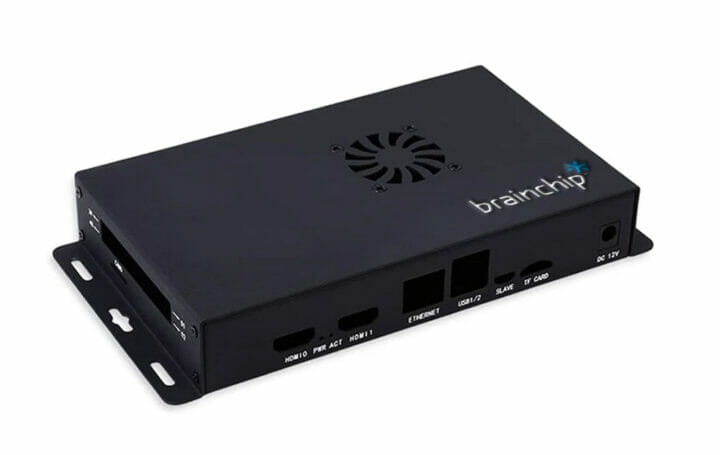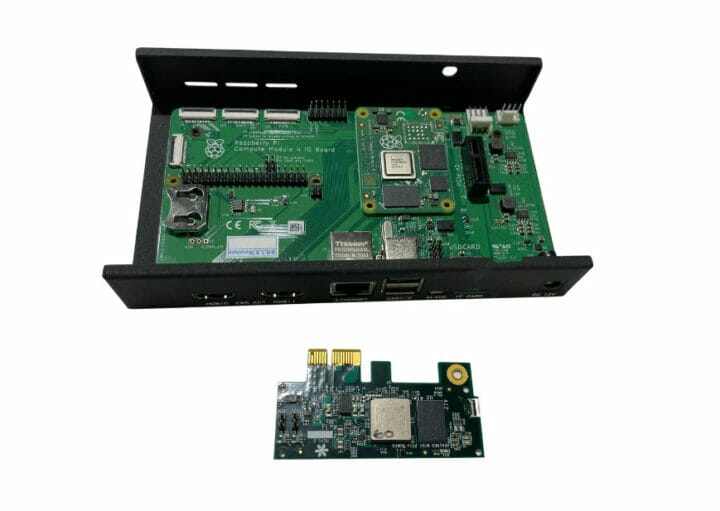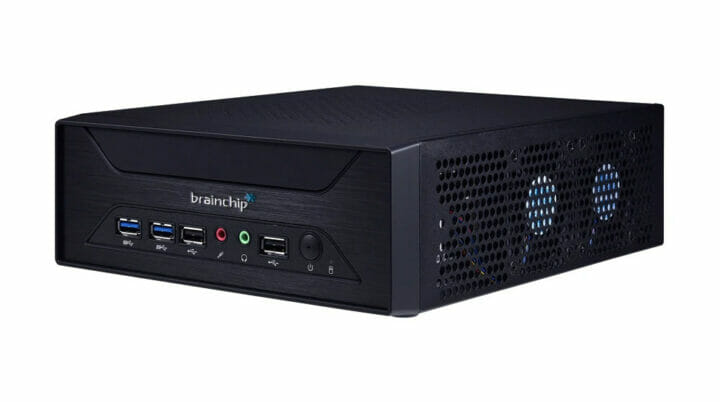BrainChip has introduced two development kits for its Akida AKD1000 neuromorphic processor based on Raspberry Pi and an Intel (x86) mini PC in order to enable partners, large enterprises, and OEMs to begin testing and validation of the Akida chip.
BrainChip Akida neural relies on spiking neural networks (SNN) which enable high-performance, real-time inference at ultra-low power, notably much lower power than traditional AI chips relying on CNN (convolutional neural network) technology.
Akida Development Kit based on Raspberry Pi CM4
Specifications:
- SoM – Raspberry Pi CM4 or CM4 Lite with
- SoC: Broadcom BCM2711C0 quad-core ARM Cortex-A72 (ARMv8-A) 64-bit @ 1.5GHz plus Broadcom VideoCore VI GPU
- RAM – 1GB, 2GB, 4GB, or 8GB LPDDR4 SDRAM
- Storage – MicroSD card for CM4 Lite, or 2GB to 32GB eMMC for CM4
- Networking – Optional 2.4 GHz and 5 GHz 802.11b/g/n/ac Wi-Fi, Bluetooth 5.0 LE, Gigabit Ethernet PHY
- Carrier board – Official Raspberry Pi Compute Module 4 IO board with PCIe slot, 2x DSI, 2x CSI, 2x HDMI
- AI accelerator – Mini PCIe card with Brainchip Akida AKD1000 AI chip
- Dimensions – 20.06 x 10.5 x 3.7cm
The kit is just comprised of off-the-shelf parts (RPi CM4 + carrier board) housed in an enclosure with the company’s Akida AI accelerator card.
Akida Development Kit based on Shuttle PC
- SoC support – LGA1200 socket for 10th-gen Intel Core i9/i7/i5/i3, Pentium Gold, and Celeron “Comet Lake-S” processors with up to 65W TDP. Includes Heatpipe cooling system with two fans
- System Memory – 2x 260-pin SO-DIMM slot for DDR4-2933 /2666 up to 2x 32 GB RAM
- Storage
- 1x 2.5-inch bay for SATA hard disk or SSD, max. 9.5 mm
- 1x M.2-2280M slot (supports PCIe x4 NVMe or SATA)
- Video Output – HDMI 2.0a, VGA
- Audio – 2x 3.5mm audio jacks for line out and mic
- Networking
- Gigabit Ethernet RJ45 port
- 1x M.2-2230AE for an optional WLAN card
- USB – 4x USB 3.2 Gen1, 4x USB 2.0, 1x USB 2.0 internal USB stick
- Serial – Optional RS232 COM port
- Expansion – 1x PCI Express X16 v3.0 slot
- AI accelerator – Mini PCIe card with Brainchip Akida AKD1000 AI chip
- Power Supply – External 180 W / 19.5 V power adapter
- Dimensions – 25 x 20 x 7.85cm
Windows 10 and Linux (64-bit)
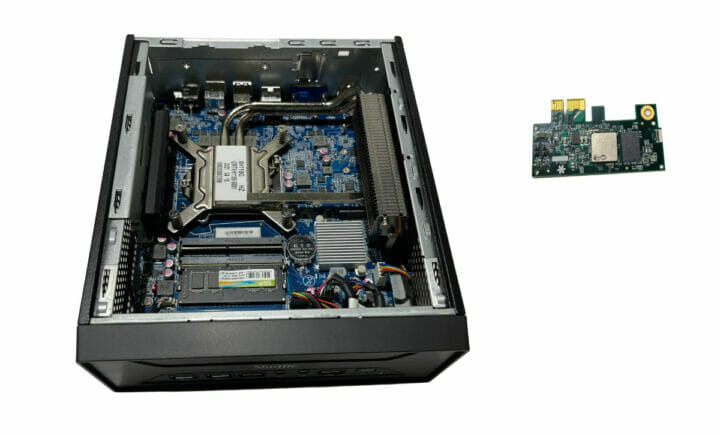 That development kit is basically Shuttle XH410G mini PC with Braindchip Akida mPCIe card.
That development kit is basically Shuttle XH410G mini PC with Braindchip Akida mPCIe card.
BrainChip AKD1000 NSoC and software support
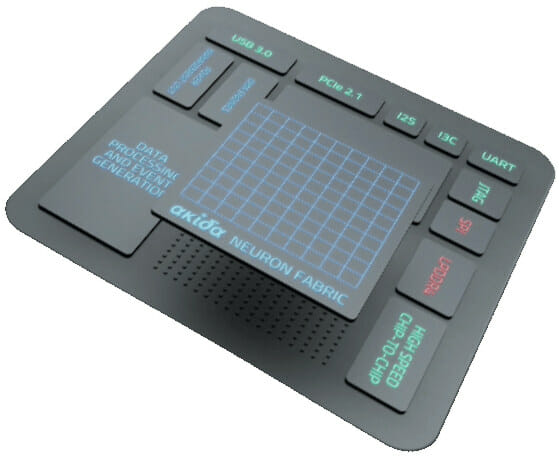 The neuromorphic SoC (NSoC) emulates 1.2 million neurons and 10 billion synapses with Akida neuron fabric and offers the following key features and interfaces:
The neuromorphic SoC (NSoC) emulates 1.2 million neurons and 10 billion synapses with Akida neuron fabric and offers the following key features and interfaces:
- M-Class SPU with FPU and DSP
- Memory I/F – LPDDR4
- Storage – SPI flash for boot/storage
- Akira Neuro Fabric – 80 NPUs, digital logic with 8MB SRAM
- Data input interfaces
- PCIe 2.1 x2
- USB 3.0
- I3C, I2C, UART, JTAG
- Data processing – Pixel event converter; SW data-event encoder; multivariable digital data; sound, pressure, temperature… data handling
- Multi-chip expansion via additional PCIe 2.1 2-lane root complex with up to 64 “daisy-chained” devices
- Process – 28nm TSMC
The development kits listed above include the Meta TF Software Development Environment, a User Guide, and examples of Akida Models. Interviewed by EETimes, Anil Mankar, BrainChip co-founder and chief development officer, explains that people who are familiar with the TensorFlow or Keras API can take their existing application, network, dataset, and run it on Akida hardware after going through quantization-aware training, and measure the power themselves. So there’s no need to understand exactly how SNN works.
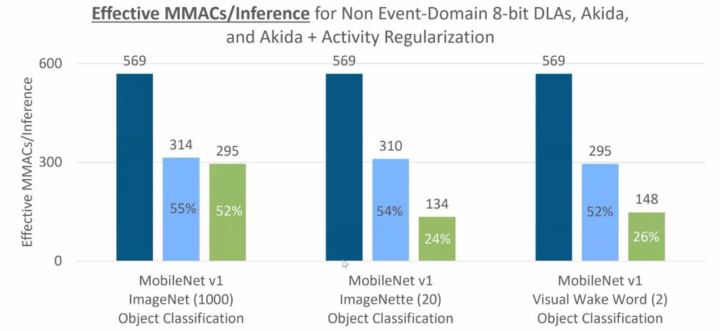
The way they compare the solution to CNN is interesting as they report the number MAC operation needed per inference instead of direct mW values. Yet the EETimes article also provides some power consumption numbers:
… a keyword-spotting model running on the Akida development board after 4-bit quantization consumed as little as 37 µJ per inference (or 27,336 inferences per second per Watt). Prediction accuracy was 91.3 percent, and the chip was slowed to 5 MHz to achieve the observed performance.
Availability and Price
Neuromorphic chips based on spiking neural networks are still emerging technology, and the price of the development kits reflects this with the Raspberry Pi devkit going for $4,995 and the Shuttle PC kit for $9,995. More details can be found on the BrainChip website. Other companies working on SNN AI chips include Innatera and Prophesee.

Jean-Luc started CNX Software in 2010 as a part-time endeavor, before quitting his job as a software engineering manager, and starting to write daily news, and reviews full time later in 2011.
Support CNX Software! Donate via cryptocurrencies, become a Patron on Patreon, or purchase goods on Amazon or Aliexpress


